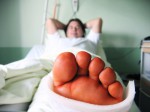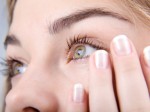 Sleep is vital for our mental and physical recovery and yet many of us struggle at night to get enough.
Sleep is vital for our mental and physical recovery and yet many of us struggle at night to get enough.
Early morning starts for sports training; cramming late at night for exams; breast feeding babies; waiting up for a family member out for a night on the town; or unable to sleep worrying about something; our sleep pattern can often be broken.
For some families this is a regular occurrence. Maybe one parent is a shift worker and regularly comes home in the morning as everyone else is leaving. They may find it hard to catch up on sleep and exercise during the day. Whatever the reason, studies have shown that a chronic lack of sleep can have a major impact on our nutritional well- being, our mental and physical health.
How much sleep do we need each day? 1
Age group Hours
Pre-schoolers 10-13
5- year-olds 9-11
Teenagers 8-10
Adults 7-9
Good quality sleep is not only measured by the length of time actually sleeping (i.e duration) but also by sleep efficiency (i.e the percentage of the time spent in bed trying to get to sleep until finally waking up). A normal sleep efficiency rate is 85% or higher. As this % rate of efficiency falls our mental health is compromised.2
Sleep and mental health
A lack of sleep can affect the quality of our life because it can alter the decisions that we make.
Self-regulation
Insufficient sleep can impair our ability to self-regulate the things we do. I.e. to manage our thinking and emotions so that we can achieve goals by organizing our behavior, controlling our impulses and being able to solve problems in a consistent way.
To do this, three interrelated capabilities are involved:
- Cognition and executive functioning– eg paying attention, organizing, planning, prioritizing, completing tasks, understanding viewpoints, self- monitoring, being mentally flexible so that we can shift our attention in response to different demands- to be able to apply different rules in different settings so as to understand and accomplish complex tasks.
- Emotional – e.g being aware of our emotions and how to manage them and respond.
- Behavioural-g. impulse control and delay of gratification. 3
We take all these self-regulatory activities for granted but these are governed by a number of regions in the brain such as the prefrontal cortex, amygdala and ventral striatum all of which are undergoing considerable developmental change, particularly during adolescence, and their function is adversely affected by a lack of sleep.3
Circadian Rhythms and Dis-regulation
Apart from a lack of sleep, when we sleep, can also affect self- regulation and this is governed by circadian rhythms (CRs).
CRs are part of a natural internal process that regulates the sleep-wake cycle and repeats roughly every 24 hours. CRs are adjusted by our own internal body clock as it responds to environmental cues such as daylight, temperature, latitude, feeding, and oxygen supply etc. CRs are important for metabolism, performance and psychological function and disruption can occur, particularly for athletes on tour or people travelling across different time zones.
Everyone has their own Chronotype i.e the time of day they work and feel the best such as in the morning (often referred to as a ‘lark’) or at night (as an ‘owl’).This is a trait that is genetically determined.
Research with athletes has found that when the time of their training or competition fails to align with their own personal best time of day, their actual and perceived sporting performance may decline.3
Insomnia Disorder
This is said to occur when a person is unable to initiate and maintain sleep for at least 3 nights for at least 3 months despite having adequate opportunity. When this is associated with daytime sleepiness and fatigue it is a major risk factor for impaired mental and physical function.
Sleep deprivation can be a major problem for athletes around times of competition with 64% of Olympic athletes reporting that insomnia affected them. 4,5
Sleep Apnoea
This involves a sporadic reduction or cessation of breathing while sleeping and is often associated with high BMI’s (although not always). It can also occur when sleeping at high altitude. Untreated, sleep apnoea increases fatigue, impairs athletic performance and increases the risk of injury, so it is important to discuss this with your doctor if this affects you.4,5
Sleep deprivation and key nutritional issues
Growth and repair
Sleep is important for restoring energy and as much as 95% of our daily growth hormone is released into the blood stream during sleep. Its main role is to assist muscle and bone growth and repair which is particularly important for children. Insufficient or poor- quality sleep can have a negative effect on a child’s behaviour, learning, health, wellbeing and weight.2
Stress reduction
Cortisol is a steroid hormone important for physiological and behavioral responses during times of stress (such as observed in the fight or flight response when we feel under attack). Cortisol regulates the immune system and also controls muscle development by counter- balancing the hormone Testosterone which is important for muscle growth and adaption following resistance training.
A chronic lack of sleep can cause spikes in cortisol production.
Too much cortisol can affect our mood, influence digestion and metabolism causing weight gain, inflammation, memory problems, anxiety and depression, headaches and heart disease.4
Disease prevention
Sleep helps to reduce the risk to health of:
- Diabetes mellitus by helping to reduce insulin resistance lowering glucose levels.
- Obesity by lowering the hormone Gherlin, that stimulates appetite and raising Leptin the hormone that makes us feel full, sleep is able to help us control body weight. Sleep deprivation is associated with greater central adiposity, higher waist circumference measurements and Body Mass Index (BMI).
- Cardiometabolic health. Sleep helps improve HDL (good) cholesterol levels; systolic blood pressure; and reduces fat mass. 6
Groups at risk
We all need a good night’s sleep but some groups within our community are more prone to sleep disturbance than others.
- Shiftworkers who work through the night, or people up late trying to finish projects or assignments, parents of young children juggling night feeding. These people may experience long periods of broken and poor-quality sleep.
- Elderly people may find it takes longer to get to sleep (sleep latency), their sleep may be fragmented throughout the night with an overall decline in the good quality deep REM sleep. So, despite going to bed early they may wake early still feeling very tired 7
- Athletes are particularly at risk because sleep is an important element of their recovery after training and without it, fatigue can set in and lead to injury, maladaption, over- reaching and overtraining 2
Food Factors
Caffeine
It’s very easy to think that a can of energy drink or several coffees will pull you through a night working late, but this can also play havoc with your sleep when you eventually need to calm down.
Research has found that caffeine can increase the time it takes to get to sleep and also to reduce the total sleep time.
Children are more sensitive to caffeine than adults because of their smaller body size which can make them more susceptible to its stimulatory effect. So, parents pay attention to possible sources of caffeine in your child’s diet such as energy drinks,8 chocolate, tea and coffee if they are finding it hard to sleep.
Snacking
People working late at night often consume more sugar sweetened beverages, 8 confectionery and takeaways in order to stay awake. However, this can deliver an extra load of saturated fat, salt, sugar and calories raising the risk of weight gain, cardiovascular problems and diabetes. If working late is part of your norm it is important to see a Dietitian and learn how to change your eating patterns to maximise work output and maintain good health.
Alcohol
Alcohol can have a major effect on mental health and self-regulation. As alcohol intake increases it impairs reaction times and decision-making processes, it diminishes hand-eye co-ordination and fine motor control. It also reduces accuracy, balance and reflex responses. Complex co-ordination is compromised and mood can become depressed, causing headache and hypersensitivity.9,10
In terms of sleep alcohol blocks REM sleep making people feel groggy and unfocused on waking. As alcohol causes our whole body to relax including the muscles around the throat this can make people more prone to snoring and sleep apneoa. Alcohol is also a diuretic so although you may fall asleep quickly after drinking it, sleep is likely to be interrupted by frequent trips to the bathroom. 11
Tips to improve the sleep hygiene of your family 1
Eating well and having regular exercise can go a long way to improving sleep quality. However it is also important to try to establish a good sleep hygiene.
- Set a regular bedtime routine by going to bed and getting up at around the same time each day, including on the weekends.
- Relax and unwind before bed. Try to spend the last hour you’re awake doing calming activities like reading, having a shower or bath or doing mindfulness activities.
- Remove from the bedroom things that might cause distractions to sleep such as electronics (including any television, computers, game consoles, or cell phones).
- Limit screen time to less than two hours per day; encourage more physical activity, as this can improve the quality of sleep.
- If sleep loss is a persistent problem, then talk to your doctor and contact me for an assessment to ensure that your diet isn’t contributing to the problem.
More articles by Lea on a similar subject
What’s to drink
Daily fix: Kick the soft drink
Wise up to Discretionary Foods
Are you a ‘sneaky snacker’?
Feeling full is the secret to weight loss
Brain food part 2:Thinking food
References
- MOH NZ Sleeping 2019 Helping children sleep better https://www.health.govt.nz/your-health/healthy-living/food-activity-and-sleep/sleeping/helping-young-children-sleep-better
- O’Donnell S, Beaven M, Driller MW. From pillow to podium: a review on understanding sleep for elite athletes. Nat.Sci. Sleep. 2018; 10:243-253.
- Owens JA, Earth-Wesley T, Lewin D, Gioia G, Whitaker RC. Self -regulation and sleep duration, sleepiness and Chronotype in athletes. Paed 2016 Dec, 138 (6).
- Reardon CM.et al. Mental health in elite athletes: International Olympic Committee Consensus Statement (2019) Br.J Sport .Med. 2019; 53:667-699.
- Owens J Adolescent sleep working group, committee on adolescence. Insufficient sleep in adolescence and young adults: An update on causes and effects. Paediatrics 2014,134(3)
- Cespedes Feliciano EM, Quante M, Rifas-Shima SL, Redline S, Oken E, Taveras EM. Objective sleep characteristics and cardio metabolic health in young adolescents. Paediatrics 2018 Jul, 142 (1).
- Aging and sleep. July 2020 Sleep Foundation.org.
- Committee of Nutrition and the Council on Sport Medicine and fitness. Sports drinks and energy drinks for children and adolescents. Are they appropriate? Paediatrics. June 2011,127 (6) 1182-1189
- Alcohol and medications
- Reiken, G.B, 1991, Negative effects of alcohol on physical fitness and athletic performance. Journal of Physical Education, Recreation and Dance, 62(8): 64-66
- How alcohol effects the quality and quality of sleep. July 28 2020. The Sleep Foundation.org





























































Leave a Reply